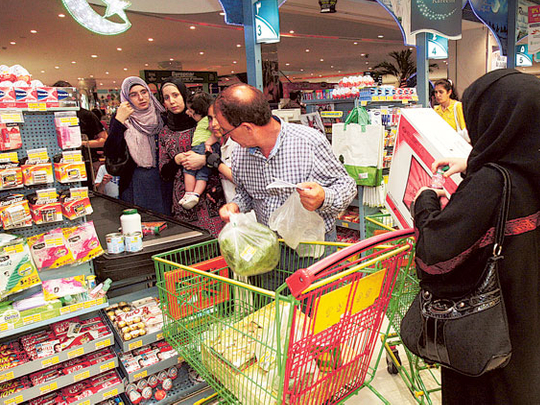
Many UAE consumers are spending less than they used to because they are worried about rising rents and living standards, findings of a new study suggest.
The latest consumer confidence index by Nielsen released on Wednesday showed that overall sentiment in the UAE declined by five points in April-June over the previous quarter. The country’s index score of 109, however, is still the highest in the Middle East and Africa region.
A decline in sentiment indicates a gloomy view on the state of the economy, particularly on household incomes and job prospects, which then causes people to purchase less.
According to Arslan Ashraf, managing director, Nielsen Arabian Peninsula, people in the UAE anticipate that the continued rise in rent will cause an upward pressure on the cost of daily essentials and services.
“Rising rents are actually bringing the consumers’ sentiments down. They do anticipate that rising rents will ultimately contribute to inflationary pressure on the prices of other products and services,” Ashraf told Gulf News.
Rents in Dubai have gone up by more than 60 per cent between June 2013 and June 2014. International City apartments registered the highest increase (66 per cent), followed by Jumeirah Lakes Towers (54 per cent) and Deira (49 per cent). Residential units in Dubai Marina are now 45 per cent more expensive to rent, while other areas posted increases of between 21 and 42 per cent.
Ashraf, however, echoed analysts’ views that the real estate market is showing “signs of rebalancing after a rapid growth in two years.” “One of the key reason is reduced speculation as a result of various government measures,” he said.
Consumers are also less optimistic about employment opportunities, with only 68 per cent of UAE residents feeling positive about local job prospects over the next 12 months, compared to 71 per cent in the first quarter. Across the region, job sentiments increased by two percentage points to 42 per cent.
Fewer people in the UAE (60 per cent) also believe that the state of their finances is good or excellent, down from 65 per in the first quarter. About three in 10 people (30 per cent) said that their finances either look bad or don’t look so good. Across the Middle East and Africa, more than half of people polled by Nielsen (56 per cent) said they view their personal finances in a positive light.
The Nielsen consumer confidence index measures perceptions of local job prospects, personal finances and immediate spending intentions. Confidence levels above and below a baseline of 100 indicate degrees of optimism and pessimism, respectively.
Globally, consumer confidence increased one index point to 97 in the second quarter of 2014, following a two-point growth at the start of the year. The positive momentum comes after a stagnant 2013, during which consumer sentiment stuck at 94 for three out of four quarters.
The survey was conducted May 12 to 30, 2014 among consumers in 60 countries.












